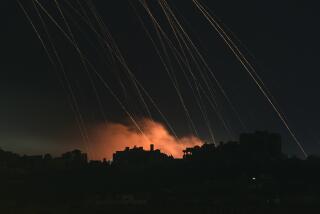Hell in the Stomach
- Share via
“True war stories do not generalize,” Tim O’Brien wrote in “The Things They Carried,” his collection of stories about the Vietnam War. “For example: War is hell. As a moral declaration, the old truism seems perfectly true, and yet because it abstracts, because it generalizes, I can’t believe it with my stomach.... A true war story, if truly told, makes the stomach believe.”
“The Sand Storm: Stories From the Front,” one of the first plays to be written about Iraq, is a true war story. In 10 wrenching monologues, Sean Huze, a playwright and an Operation Iraqi Freedom veteran, makes his audience stomach hell.
A Marine already sweltering like a “chicken pot pie in a microwave” gets just 1 liter of water a day -- and the water is too hot to drink.
A private searching for survivors amid the wreckage of shot-out buses trips over a blown-off foot -- and becomes obsessed with finding the leg it once matched.
A sergeant who’s gone 30 hours without sleep loses control and begins kicking a kneeling “rag,” then realizes, to his even greater shame, that the private under his command has begun kicking the Arab man too.
And over and over, Huze’s actors recount returning enemy fire in streets filled with civilians, as horrified by their own numbness as by the women and children left wounded and dead.
This editorial, like other reviews and interviews, probably will mean more hate mail for Huze, who walked into a storefront recruitment center and signed up for the Marine Corps on Sept. 12, 2001.
Not everyone believes that a volunteer disillusioned by his president’s reasons for war can remain a patriot. Not everyone sees a distinction between war as hell and soldiers as devils.
Maybe that’s because paradoxes -- like “oppose the war, support the troops,” the mantra of today’s antiwar movement -- are abstractions, generalizations. Huze’s play, at the Elephant Asylum Theatre until April 23 in Hollywood, is not.
In the final monologue, Huze plays a Marine who tells of Iraqis cooling his water bottle in their refrigerator and of an Iraqi girl kissing a photo of his baby boy. “Maybe,” says an earlier monologist, “it’s OK to do the right thing for the wrong reason.”
“The Sand Storm” delivers the soldiers’ doubts, fears, shame and homesickness like a punch. It aims to change our minds even as it breaks our hearts.
More to Read
The biggest entertainment stories
Get our big stories about Hollywood, film, television, music, arts, culture and more right in your inbox as soon as they publish.
You may occasionally receive promotional content from the Los Angeles Times.










